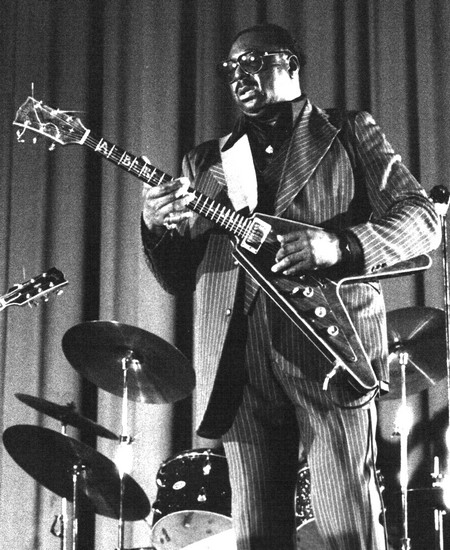Tags: music
I’ve been listening to blues lately and it turns out my favourite king of all three is Albert King and his last name wasn’t even King.
Albert King
Albert King (b. Albert Nelson, April 25, 1923 – December 21, 1992) was born on a cotton plantation in Indianola, Mississippi. During childhood he sang at a church with a family gospel group, in which his father played the guitar. One of 13 children, he grew up picking cotton on plantations near Forrest City, Arkansas, where the family moved when he was eight years old.

King’s identity was a longtime source of confusion. He stated in interviews that he was born in Indianola on April 25, 1923 (or 1924), and was a half-brother of B.B. King (whose hometown was Indianola), but documentation suggests otherwise. King stated that whenever he performed at Club Ebony in Indianola, the event was celebrated as a homecoming, and he cited the fact that B.B.’s father was named Albert King. However, when he applied for a Social Security card in 1942, he gave his birthplace as “Aboden” (most likely Aberdeen, Mississippi) and signed his name as Albert Nelson, listing his father as Will Nelson. Musicians also knew him as Albert Nelson in the 1940s and early 1950s.
He started using the name Albert King in 1953 as an attempt to be associated with B.B King; he was billed as “B.B. King’s brother”. He also used the same nickname as B.B King, “Blues Boy”, and he named his guitar “Lucy” (B.B. King’s guitar was named “Lucille”).[7] B.B. King later said: “He called his guitar ‘Lucy,’ and for a while he went around saying he was my brother. That bothered me until I got to know him and realized he was right; he wasn’t my brother in blood, but he sure was my brother in the blues.”
According to King, his father left the family when Albert was five, and when he was eight he moved with his mother, Mary Blevins, and two sisters to an area near Forrest City, Arkansas. He said his family had also lived in Arcola, Mississippi, for a time. He made his first guitar out of a cigar box, a piece of a bush, and a strand of broom wire. He later bought a real guitar for $1.25. As a left-hander learning guitar on his own, he turned his guitar upside down. He picked cotton, drove a bulldozer, worked in construction, and held other jobs until he was able to support himself as a musician. Source
B. B. King
Riley B. King (September 16, 1925 – May 14, 2015), known professionally as B. B. King, was an American blues guitarist, singer, songwriter, and record producer. He introduced a sophisticated style of soloing based on fluid string bending, shimmering vibrato, and staccato picking that influenced many later blues electric guitar players. AllMusic recognized King as “the single most important electric guitarist of the last half of the 20th century”. King was inducted into the Rock and Roll Hall of Fame in 1987 and is one of the most influential blues musicians of all time.

While young, King sang in the gospel choir at Elkhorn Baptist Church in Kilmichael. King was attracted to the Pentecostal Church of God in Christ because of its music. The local minister performed with a Sears Roebuck Silvertone guitar during services and taught King his first three chords.King ’s first guitar was bought for him by Flake Cartledge, his employer in Kilmichael, for 15 dollars. Cartledge withheld money from King’s salary for the next two months until the debt was repaid. Source
Freddie King
Freddie King (September 3, 1934 – December 28, 1976) was an American blues guitarist, singer and songwriter.

Freddie King was born in Gilmer, Texas to Ella Mae King and J. T. Christian. In 1949, he and his family moved from Dallas to the South Side of Chicago.
In 1952, King started working in a steel mill. In the same year he married another Texas native, Jessie Burnett. They had seven children together.
King became acquainted with the guitar at the age of six. He started learning the guitar from his mother and his uncle. King moved to Chicago when he was a teenager; there he formed his first band the Every Hour Blues Boys with guitarist Jimmie Lee Robinson and drummer Frank “Sonny” Scott. As he was repeatedly being rejected by Chess Records, he got signed to Federal Records, and got his break with single “Have You Ever Loved a Woman” and instrumental “Hide Away”, which reached number five on the Billboard magazine’s rhythm and blues chart in 1961. Source